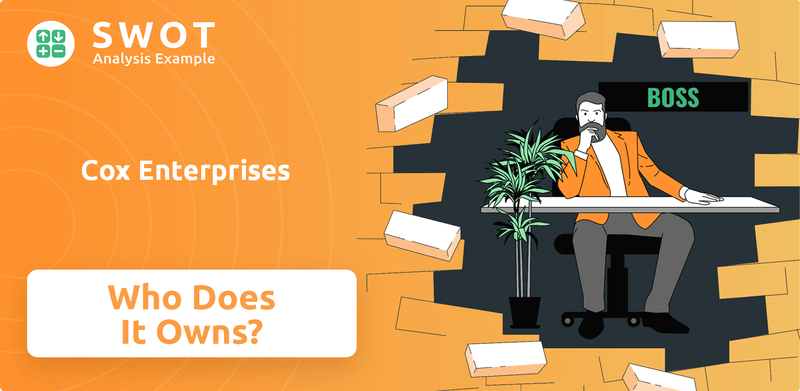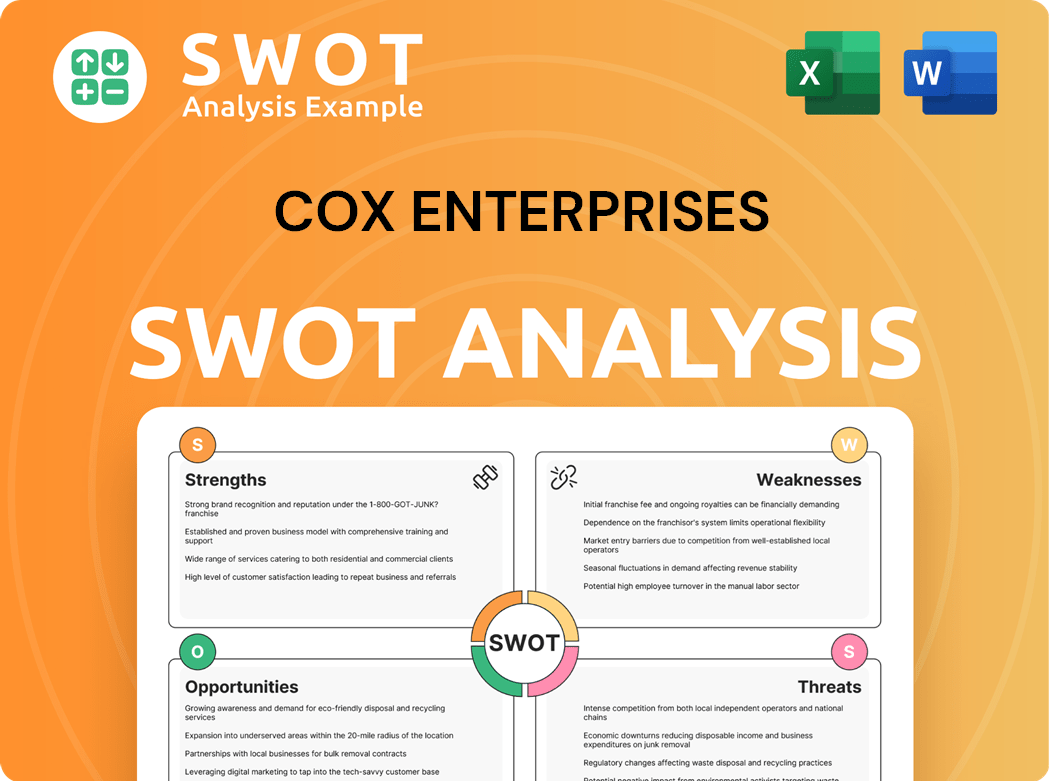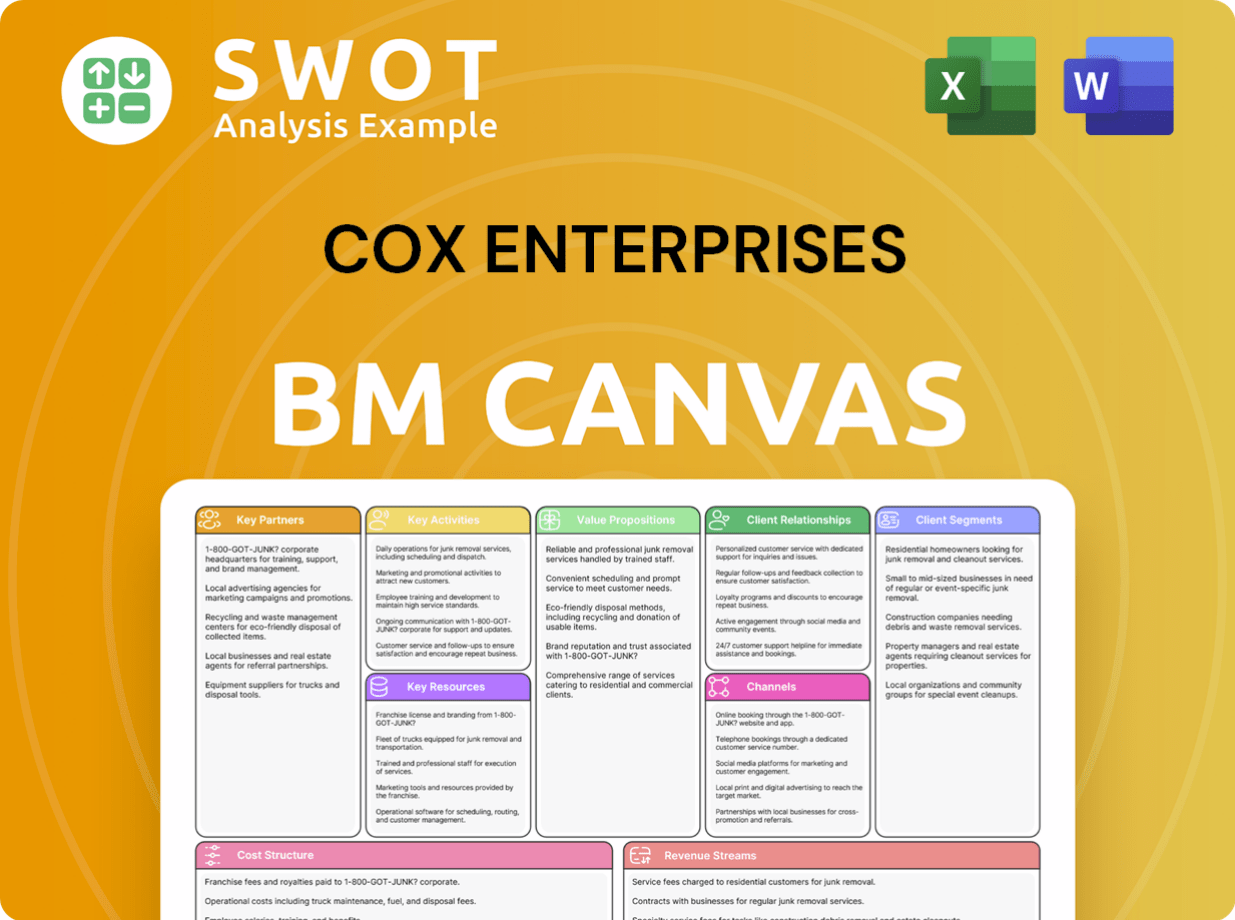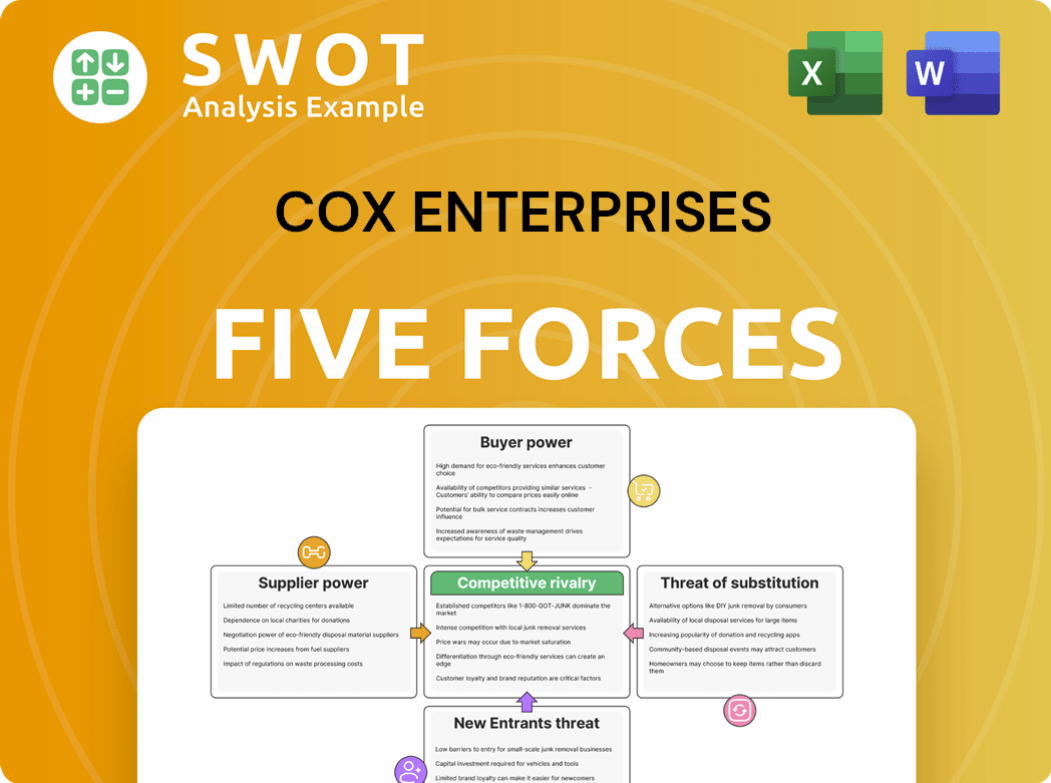Cox Enterprises Bundle
Who Truly Owns Cox Enterprises?
Unraveling the ownership structure of Cox Enterprises is key to understanding its strategic moves and future trajectory. With a significant transaction on the horizon, the question of "Who owns Cox" becomes even more critical. This exploration dives deep into the company's ownership, offering a comprehensive view of its past, present, and future.

From its humble beginnings as a newspaper publisher, Cox Enterprises has evolved into a media and automotive powerhouse. Understanding the Cox Enterprises SWOT Analysis is crucial for investors. The forthcoming merger of Cox Communications with Charter Communications further reshapes the landscape, making it essential to examine the Cox Company's ownership in detail. This analysis will shed light on the key players and their influence within Cox Enterprises, including its subsidiaries like Cox Media Group and Cox Automotive, and address questions like "Who is the owner of Cox Enterprises?" and "Is Cox Communications a public company?"
Who Founded Cox Enterprises?
The foundation of Cox Enterprises rests on the vision of James M. Cox, who established the company in 1898. He began his venture by acquiring the Dayton Evening News for $26,000, marking the start of what would become a vast media and communications enterprise. Cox, a former Ohio Governor and a Democratic presidential nominee, laid the groundwork for the company's future success.
From its inception, Cox Enterprises has been a privately held, family-owned business. This structure has allowed the company to maintain its core values and strategic direction over the years. The commitment to family ownership has been a defining characteristic of the company's identity.
The company's early focus was on newspaper publishing. Over time, it expanded into broadcasting and cable, diversifying its portfolio. This strategic evolution has helped the company adapt to changing market dynamics and technological advancements.
James M. Cox founded the company in 1898. He started with the purchase of the Dayton Evening News.
The initial investment for the Dayton Evening News was $26,000.
The company has remained privately held and family-owned since its founding. This has allowed it to maintain a long-term vision.
The primary focus of the company was newspaper publishing. This formed the basis of its early operations.
The company expanded into broadcasting and cable businesses. This diversification helped it grow and adapt to changing markets.
Family control has been a constant. This ensures that the company's values and vision are maintained through generations.
In 1964, James M. Cox's son combined the broadcasting and cable businesses into the publicly-traded Cox Broadcasting Corporation (CBC), while the newspaper business remained independent as Cox Enterprises. The company's cable operations were later consolidated into Cox Cable Communications (CCC) in 1968, which evolved into Cox Communications, Inc. in 1982. After the death of Jim Cox Jr. in 1974, his sisters, Anne Cox Chambers and Barbara Cox, took control of 95% of the privately-owned company, reinforcing the family's commitment to the business. Today, the question of Who owns Cox Enterprises is still centered around the Cox family.
The history of Cox Enterprises is marked by family ownership and strategic diversification. The company's evolution reflects its ability to adapt and grow over time.
- Founded in 1898 by James M. Cox.
- Initially focused on newspaper publishing.
- Expanded into broadcasting and cable.
- Family ownership has been a constant.
- Cox Communications became a significant part of the business.
Cox Enterprises SWOT Analysis
- Complete SWOT Breakdown
- Fully Customizable
- Editable in Excel & Word
- Professional Formatting
- Investor-Ready Format

How Has Cox Enterprises’s Ownership Changed Over Time?
The ownership structure of Cox Enterprises reflects its long-standing status as a privately held, family-owned business. The Cox family, descendants of the founder, maintains majority ownership and control. This structure allows for strategic decision-making that prioritizes long-term growth and stability, differentiating it from publicly traded companies. The family's influence is primarily exerted through a system of voting shares, ensuring their continued dominance in the company's direction.
Over the years, several key events have impacted the ownership and structure of Cox Enterprises. In 2019, Cox Enterprises sold a majority stake in Cox Media Group's broadcast television stations to Apollo Global Management, though it retained a minority stake. However, in a notable move, Cox Enterprises repurchased Ohio newspapers from Apollo Global Management in 2020, demonstrating a commitment to maintaining its media presence. More recently, in February 2024, Cox agreed to acquire OpenGov, a government software company, further diversifying its portfolio. These strategic moves highlight the company's adaptability and its focus on evolving market opportunities.
| Event | Date | Impact on Ownership |
|---|---|---|
| Sale of Cox Media Group's broadcast television stations to Apollo Global Management | 2019 | Reduced direct ownership in broadcast media, retained a minority stake. |
| Repurchase of Ohio newspapers from Apollo Global Management | March 2, 2020 | Re-established direct ownership of local media assets. |
| Acquisition of Axios Media | August 2022 | Expanded media portfolio. |
| Agreement to acquire OpenGov | February 2024 | Diversified into government software. |
| Combination of Cox Communications with Charter Communications | May 16, 2025 | Cox Enterprises will hold approximately 23% of the combined entity's fully diluted shares outstanding. |
The primary stakeholders in Cox Enterprises are the members of the Cox family. Alexander C. Taylor, a fourth-generation family member, holds the positions of Chairman, President, and CEO. James C. Kennedy, the grandson of the founder, serves as Chairman Emeritus. Other family members, including Henry Parry-Okeden and Barbara Kennedy Harty, also serve on the board of directors. These individuals are key to the company's strategic direction and operational oversight. The company's annual revenues were reported at $22.1 billion in 2022, increasing to $23 billion as of 2024. The continued family ownership ensures a consistent vision and commitment to the company's long-term success. For more insights into the company's strategic direction, consider reading about the Growth Strategy of Cox Enterprises.
Cox Enterprises remains a privately held, family-owned business, with the Cox family maintaining majority control.
- The ownership structure allows for long-term strategic decision-making.
- The company has made strategic acquisitions and divestitures to adapt to market changes.
- Key stakeholders include family members who hold significant leadership roles.
- Cox Enterprises reported annual revenues of $23 billion in 2024.
Cox Enterprises PESTLE Analysis
- Covers All 6 PESTLE Categories
- No Research Needed – Save Hours of Work
- Built by Experts, Trusted by Consultants
- Instant Download, Ready to Use
- 100% Editable, Fully Customizable

Who Sits on Cox Enterprises’s Board?
The current board of directors of Cox Enterprises includes a mix of family members and independent directors, reflecting the company's enduring family ownership alongside external expertise. The board is responsible for overseeing the strategic direction and governance of the company, ensuring its long-term success. The composition of the board reflects a balance between maintaining family control and incorporating diverse perspectives.
The trustees of the Cox Family Voting Trust appoint all members of the board of directors. This structure reinforces the Cox family's continued control over the company's governance. The board members include James C. Kennedy (Chairman Emeritus), Alex Taylor (Chairman and CEO), and other members such as Henry Parry-Okeden, Barbara Kennedy Harty, and Grace Lieblein. The presence of family members in key leadership and board positions, combined with the family voting trust, indicates concentrated voting power within the Cox family. The company's private ownership has prevented major public proxy battles or activist investor campaigns.
| Board Member | Title | Affiliation |
|---|---|---|
| James C. Kennedy | Chairman Emeritus | Cox Enterprises |
| Alex Taylor | Chairman and CEO | Cox Enterprises |
| Henry Parry-Okeden | Board Member | Cox Enterprises |
| Barbara Kennedy Harty | Board Member | Cox Enterprises |
| Grace Lieblein | Board Member | General Motors (Ret.) |
| Troy D. Taylor | Board Member | Coca-Cola Beverages Florida |
| Byron Trott | Board Member | BDT & MSD Partners |
| James C. “Rad” Weaver | Board Member | N/A |
| Christopher J. Williams | Board Member | N/A |
The Cox family's control over Cox Enterprises is maintained through the Cox Family Voting Trust, which appoints all board members. This structure ensures that the family retains significant influence over the company's strategic decisions and operations. Understanding the ownership structure is crucial for anyone looking into the Competitors Landscape of Cox Enterprises.
Cox Enterprises is primarily owned and controlled by the Cox family through a voting trust.
- The Cox Family Voting Trust appoints all members of the board of directors, ensuring family control.
- The board includes family members and independent directors, balancing family influence with external expertise.
- The concentrated ownership structure has prevented major public proxy battles.
Cox Enterprises Business Model Canvas
- Complete 9-Block Business Model Canvas
- Effortlessly Communicate Your Business Strategy
- Investor-Ready BMC Format
- 100% Editable and Customizable
- Clear and Structured Layout

What Recent Changes Have Shaped Cox Enterprises’s Ownership Landscape?
Over the past few years, Cox Enterprises has actively reshaped its ownership landscape through strategic acquisitions and partnerships while maintaining its core family ownership. In February 2024, the company acquired majority ownership of OpenGov, a government software firm, in a deal valued at $1.8 billion. This move expanded its footprint in the public sector technology market, building upon earlier investments in 2021 and 2022. The company continues to demonstrate a dynamic approach to portfolio management, evidenced by the 2019 sale of a majority stake in Cox Media Group's broadcast stations to Apollo Global Management, followed by the buyback of Ohio newspapers in 2020.
A significant development, announced on May 16, 2025, involves a definitive agreement for Cox Communications to merge with Charter Communications. This transaction is set to result in Cox Enterprises owning approximately 23% of the combined entity's fully diluted shares. The combined company will assume Cox's roughly $12 billion in outstanding debt and will be renamed Cox Communications within a year after closing. This strategic consolidation significantly alters the ownership structure of Cox Communications, its largest division. Cox Communications, as the largest private broadband company in America, serves approximately 7 million homes and businesses across 18 states. In 2024, Cox's revenue for its communications segment was approximately $13.5 billion.
| Key Development | Date | Details |
|---|---|---|
| OpenGov Acquisition | February 2024 | Cox Enterprises acquired majority ownership. |
| Charter Communications Merger | Announced May 16, 2025 | Cox Enterprises to own approximately 23% of the combined entity. |
| Cox Media Group Sale and Buyback | 2019-2020 | Sale of broadcast stations followed by buyback of Ohio newspapers. |
The company's focus on long-term growth and diversification includes investments in sustainable agriculture and plastics recycling, reflecting a broader trend among large enterprises to expand into new sectors. Cox Automotive, a key division, anticipates new vehicle sales to reach 16.3 million units in 2025, a 3% increase from 2024, with electrified vehicle sales expected to account for approximately 10% of the market total. For more information on the company's background, you can explore the history of Cox Enterprises.
Cox Enterprises is primarily a family-owned business. The company's ownership structure is influenced by strategic investments and divestitures. The recent acquisitions and mergers demonstrate its dynamic approach to portfolio management.
The merger with Charter Communications will change the ownership landscape. Cox Communications is the largest private broadband company, serving millions. In 2024, the revenue for its communications segment was approximately $13.5 billion.
Cox Automotive forecasts new vehicle sales to reach 16.3 million units in 2025. Electrified vehicle sales are expected to comprise about 10% of the market. This indicates growth and diversification efforts.
Industry trends show increased institutional ownership and consolidation. Cox Enterprises focuses on long-term growth and diversification. Investments in sustainable agriculture and recycling are also key.
Cox Enterprises Porter's Five Forces Analysis
- Covers All 5 Competitive Forces in Detail
- Structured for Consultants, Students, and Founders
- 100% Editable in Microsoft Word & Excel
- Instant Digital Download – Use Immediately
- Compatible with Mac & PC – Fully Unlocked

Related Blogs
- What are Mission Vision & Core Values of Cox Enterprises Company?
- What is Competitive Landscape of Cox Enterprises Company?
- What is Growth Strategy and Future Prospects of Cox Enterprises Company?
- How Does Cox Enterprises Company Work?
- What is Sales and Marketing Strategy of Cox Enterprises Company?
- What is Brief History of Cox Enterprises Company?
- What is Customer Demographics and Target Market of Cox Enterprises Company?
Disclaimer
All information, articles, and product details provided on this website are for general informational and educational purposes only. We do not claim any ownership over, nor do we intend to infringe upon, any trademarks, copyrights, logos, brand names, or other intellectual property mentioned or depicted on this site. Such intellectual property remains the property of its respective owners, and any references here are made solely for identification or informational purposes, without implying any affiliation, endorsement, or partnership.
We make no representations or warranties, express or implied, regarding the accuracy, completeness, or suitability of any content or products presented. Nothing on this website should be construed as legal, tax, investment, financial, medical, or other professional advice. In addition, no part of this site—including articles or product references—constitutes a solicitation, recommendation, endorsement, advertisement, or offer to buy or sell any securities, franchises, or other financial instruments, particularly in jurisdictions where such activity would be unlawful.
All content is of a general nature and may not address the specific circumstances of any individual or entity. It is not a substitute for professional advice or services. Any actions you take based on the information provided here are strictly at your own risk. You accept full responsibility for any decisions or outcomes arising from your use of this website and agree to release us from any liability in connection with your use of, or reliance upon, the content or products found herein.